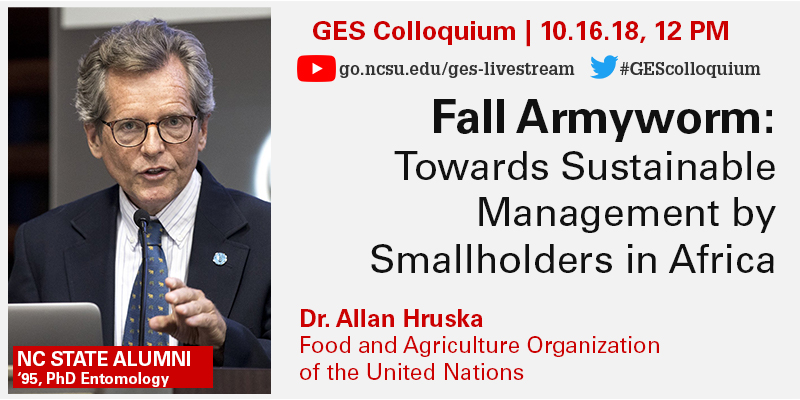
- This event has passed.
Allan Hruska – Fall Armyworm: Towards Sustainable Management by Smallholders in Africa
October 16, 2018 @ 12:00 pm - 1:00 pm

GES Colloquium | YouTube: LIVE STREAM
Fall Armyworm: Towards Sustainable Management by Smallholders in Africa
Speaker:
Allan Hruska, Principal Technical Coordinator – Fall Armyworm, Food and Agriculture Organization of the United Nations (ResearchGate, Google Scholar, Twitter @allanhruska)
Abstract:
Fall Armyworm (Spodoptera frugiperda) (FAW) is an important crop pest in the Americas, especially in tropical and sub-tropical areas where it can overwinter. FAW was confirmed in Africa in early 2016 and has quickly spread across Sub-Saharan Africa and beyond. Recently it has been confirmed in India and Yemen. It is now infesting tens of millions of acres of maize across Africa, and rapidly moving on to sorghum and millets.
In the USA and South America, FAW has been largely controlled with Bt-corn over the last 20 years. Corn farmers in Sub-Saharan Africa are largely smallholders – over 98% of Africa’s corn farmers grow small plots (typically less than two acres), often in multi-crop systems, use saved seed, use few inputs or machinery, and use most of the harvest for family consumption. Less than 10% use pesticides in their corn crop. So most African corn farmers couldn’t afford high-technology management options.
FAO has been working with smallholders, their organizations, and with support of many governments, to help innovation of locally available, sustainable management practices for FAW. Many of these practices have their basis in traditional cropping systems of Mesoamerica (plant diversity, importance of natural enemies), as well as innovations discovered and tried by smallholder corn farmers around the world. The knowledge and practices used and being tried for sustainable FAW management by smallholders will be presented.
Recommended Reading/Listening:
- FAO: Food Chain Crisis – Fall Armyworm
- FAW FAO’s Position on GM Maize
- How to Manage FAW – Guidance
- FAW Pesticides Guidance
- Audio: FAW Allan Hruska 09 May 2018
Bio:
Allan has dedicated his professional career to the support and promotion of sustainable family farming and food systems. Currently he is based in FAO’s Rome headquarters, where he is Principal Technical Coordinator for Fall Armyworm.
Previously, Allan lived and worked in Panama, Chile, Nicaragua, Honduras and Costa Rica for over thirty years, where he initiated and lead projects, programs, and institutions, taught, conducted research and provided technical and policy advice on crop protection and public health.
Before his career with FAO, he was Head of the Crop Protection Department, Zamorano University, Honduras, Executive Director, NicaSalud, Nicaragua, Assistant Country Director for CARE Nicaragua, and Professor at the National Agricultural University of Nicaragua.
He earned a PhD in entomology from North Carolina State University under Dr. Fred Gould, an MSc in genetics from Duke University, and a BS in biology from the University of Michigan. He is the author of over forty refereed publications, book chapters, reviews, and technical guides.